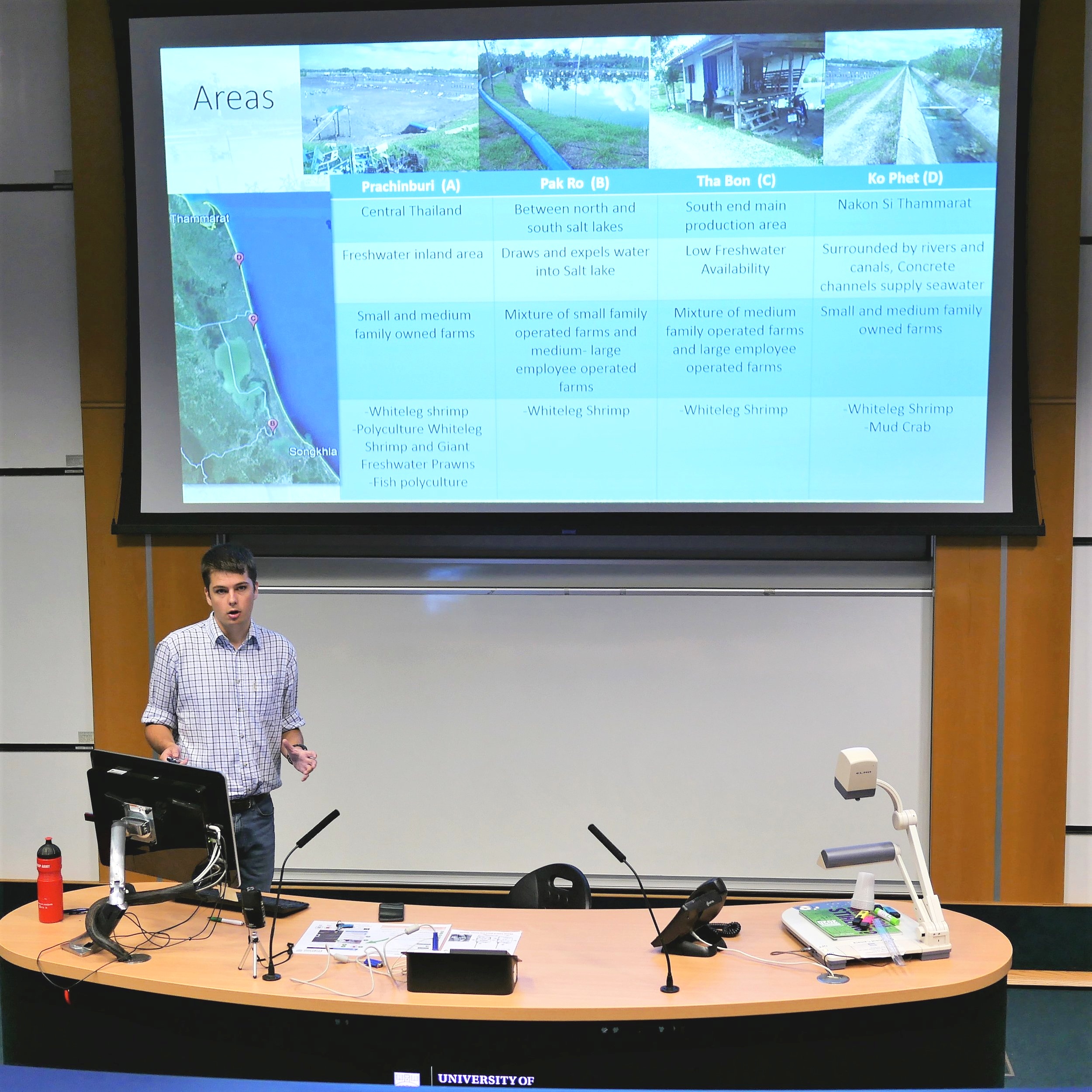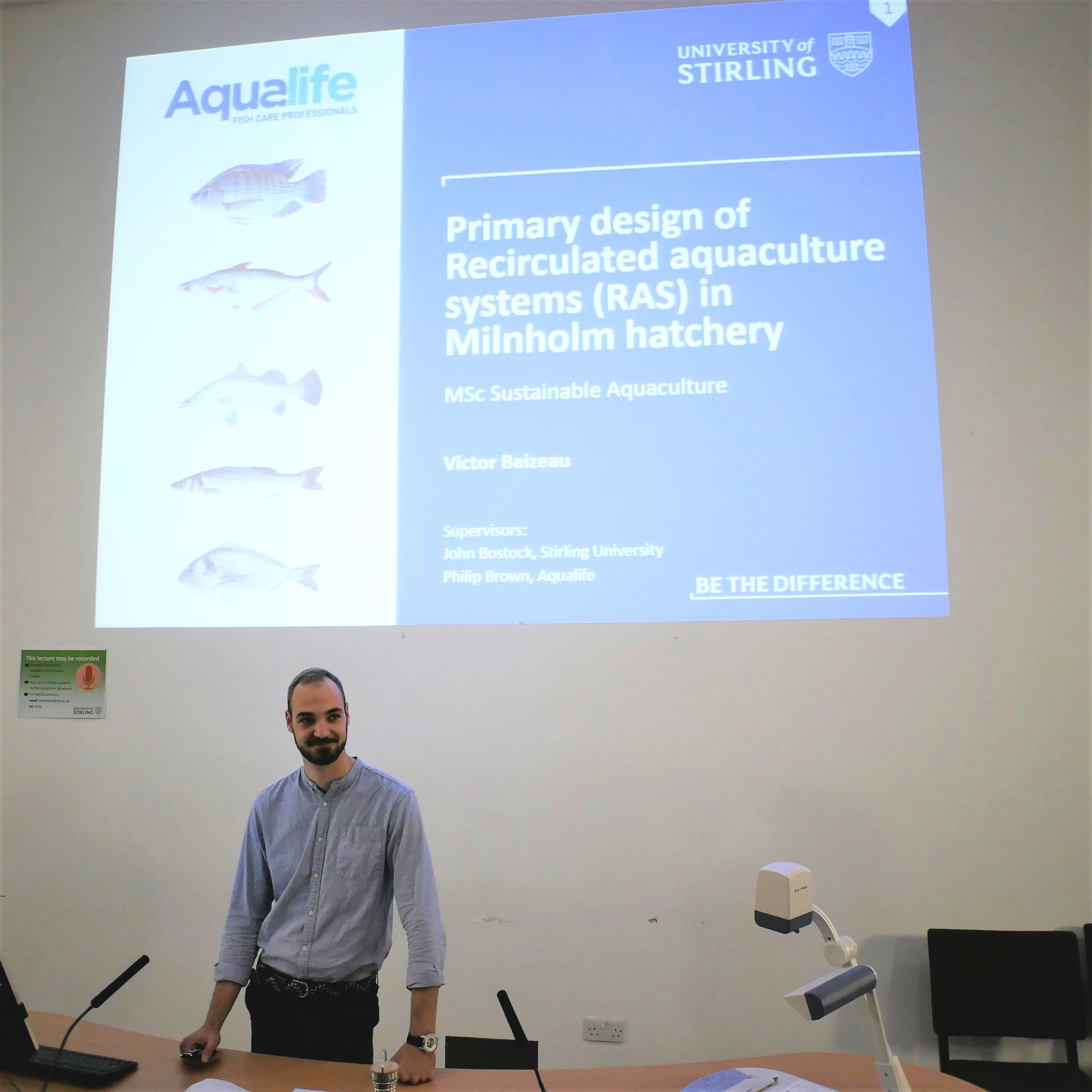Between April and August 2019, Systems Group staff supervised ten Sustainable Aquaculture MSc projects of which eight were presented at a seminar during the closing week of the course. The range of topics illustrates something of the diversity of interests within the research group and linkages with indstry and policy organisations.
Anne Rachmi from Indonesia worked with WorldFish in Bangladesh on a trial implementing the use of airlift pumps in fish production ponds as a means of sustainable intensification. The trials demonstrated the potential to increase yield whilst reducing unit production cost. The work was carried out in association with the EURASTIP project.
William McDonald from England travelled to Thailand to investigate how shrimp farmers there have adapted to the effects of Acute Hepatopancreatic Necrosis Disease, better know as Early Mortality Syndrome which badly impacted production from 2012 onwards. In a survey of 74 farms in three provinces he found a reduction in the intensity of production to be the most common adaptation strategy, with diversification of species particularly to mud crab and also significant. The work was carried out in association with the EURASTIP project and assistance from Nam Sai Farms.
Proscovia Alando from Kenya looked at the health benefits of consuming n-3 fatty acids from oil-rich marine fish in relation to government recommended intake of EPA+DHA. She studied the levels of fish consumption in the UK population and conducted fatty acid analysis of different foods available to the UK consumer to compare with the health benefits consuming these foods. She purchased selected food sources consisting of seafood (fish) and poultry (normal or fed an enriched n-3 diet) from retailers and analysed their fatty acid profiles, with respect to EPA+DHA. As a perspective on this issue she calculated that n-3 enriched chicken costs 18 times more than farmed salmon while standard chicken would cost 61 times more to meet the recommended daily intake of EPA+DHA for coronary heart disease prevention.
Victor Baizeau from France worked with AquaLife on the design of a low-cost recirculated aquaculture system for holding a range of freshwater and marine fish species for demonstration purposes at their facility outside Stirling. This involved design and dimensioning to fit available space and selection of appropriate components to maintain suitable environmental conditions for the fish.
Mark Jones from Shetland also worked with AquaLife and Victor’s project to look into the feasibility of using renewable energy sources to power the proposed recirculating aquaculture systems. Options investigated included wind, solar and water with solar proving to have the best potential with respect to both power supply and cost per unit. Overall however, the power requirements were well in excess of what could be provided through on-site renewable energy systems, so they could only be a contribution to reducing carbon emissions.
Moses Ekemini Okon from Nigeria used various modelling approaches to examine how cage-based salmon farming in Scotland and Norway may differ in their impacts on the environment. In particular Norwegian Fjords tend to be much deeper than Scottish sea lochs, which greatly affects the dispersion of solid waste from the cages. This has led to differences in the resilience of benthic organisms in Scotland compared with Norway and different approaches to regulation.
Lauren Watson from Scotland looked at the opportunities and constraints to developing offshore aquaculture in Scotland. She carried out a stakeholder survey and looked at definitions of “offshore” and the environments that are being considered in relation to regulatory mechanisms.
Andrew Morton from Scotland looked into the regulatory regime for Atlantic salmon production in Scotland, Ireland and Norway, comparing and contrasting them and considering how they influenced industry conduct, investment and future expansion potential.
For further details of our MSc courses, see http://stir.ac.uk/1o4








